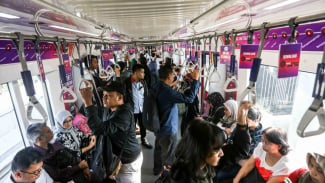Evaluating the Impact of China's Growing Soft Power in Indonesia
- Pixabay
Jakarta, VIVA – China’s use of soft power, including the promotion of its language, culture, and educational programs abroad, has become a key strategy in its international relations, particularly in Southeast Asia, including Indonesia.
By urging cultural exchanges, establishing Confucius Institutes, and offering scholarships to foreign students, China aims to build a favorable image and expand its influence without relying on coercive measures.
This approach not only helps to enhance China’s global reputation but also encourages foreign audiences to view it as a partner in development and modernization.
Forum Sinologi Indonesia
- Arianti Widya
While these efforts are often met with enthusiasm, there are some who are concerned about the presence of soft power or the motivations behind China's cultural diplomacy.
However, Singapore-based China expert Professor Leo Suryadinata remains unconvinced that China’s soft power has a significant impact in Southeast Asian countries.
According to him, the influence of China’s soft power in Southeast Asia and Indonesia remains largely unmeasured. Thus, further study is needed to assess the actual impact and influence of China’s growing soft power in the region.
“Soft power has actually been discussed since the 1980s in the United States. Initially, the concept was not applied to China because, at that time, China was still a poor country,” Suryadinata said on Tuesday (Nov 5).
He added, “This means soft power is related to a country’s strength. When a country is underdeveloped, people usually don’t talk about its soft power.”
Professor Suryadinata explained that the use of the term “soft power” to refer to China only emerged in the 21st century, as the nation became increasingly recognized for its softer influence.
“Before that, what China promoted was revolution and violence. But soft power has nothing to do with violence,” he emphasized.
He further noted that soft power is instead applied by persuading other nations to respect and honor China, which in turn leads them to act in ways that align with China’s interests.
“With the rise of China, a nation that initially lacked confidence has grown bold in promoting its culture and education abroad. Yet, the real impact remains unmeasured and is still unknown,” the professor explained.
Meanwhile, Johanes Herlijanto, Chair of the Forum Sinologi Indonesia, believes that China’s soft power—whether through education, popular culture, or media—is indeed an instrument used by China to expand its influence in Indonesia.
“Therefore, it’s important to recognize the opportunities presented by China’s soft power. The Indonesian government should seek ways to maximize its benefits for Indonesia,” said Herlijanto.
At the same time, he stressed that the Indonesian government should also strategize to prevent China from using it purely as a tool for propaganda.



























